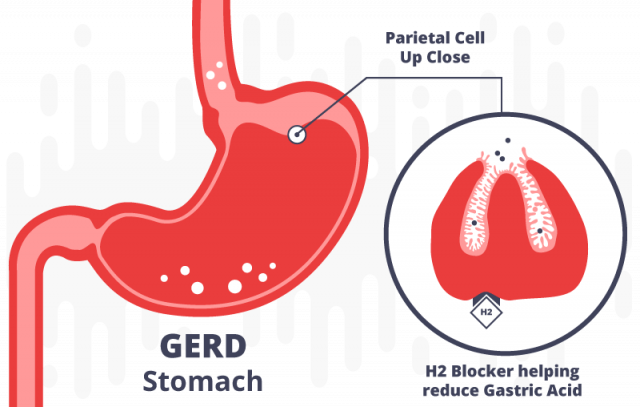Proton Pump Inhibitor (PPI) Alternatives
Proton pump inhibitor (PPI) alternatives provide ways to treat gastroesophageal reflux disease (GERD) and other peptic disorders without the serious adverse side effects PPIs can bring. PPI alternative therapies may vary in their effectiveness.
What Are PPI Alternatives?
Proton pump inhibitor alternatives are medications and nondrug remedies that treat conditions such as acid reflux and heartburn. Non-PPI options include histamine blockers, antacids, probiotics and lifestyle changes.
There are three classes of medicines that treat symptoms such as heartburn. These include the PPIs esomeprazole (Nexium), omeprazole (Prilosec), pantoprazole (Protonix) and lansoprazole (Prevacid). The others are antacids such as Maalox, Mylanta and Tums, plus H2 (histamine) receptor antagonists such as famotidine (Pepcid) and cimetidine (Tagamet).
A 2022 study reviewed research comparing several PPIs.
Other PPI alternatives that can provide relief are natural and nonmedical options such as herbal and home remedies. In some cases, surgery is an option.
While proton pump inhibitors (PPIs) are powerful drugs that treat heartburn, gastroesophageal reflux disease (GERD) and stomach ulcers, studies and PPI lawsuits link their long-term use with serious side effects, including serious electrolyte disturbances, osteoporosis-related fractures, intestinal infections and poor vitamin absorption. PPIs also can interact with other drugs, leading more people to inquire about alternatives.
Can Antacids Work as an Alternative to PPIs?
Antacids work well as an alternative to PPIs, neutralizing stomach acids to relieve occasional heartburn and other symptoms of GERD and acid indigestion. Over-the-counter antacids only treat some symptoms and not the underlying causes of GERD. They may provide quick relief of minor symptoms.
- Alka-Seltzer
- Gaviscon
- Maalox
- Milk of Magnesia
- Mylanta
- Pepto-Bismol
- Rolaids
- Tums
Zantac (ranitidine) was a popular heartburn medication until the U.S. Food and Drug Administration requested its manufacturers withdraw it from the U.S. market in April 2020. Sanofi has since introduced a new formula, OTC Zantac 360, made with famotidine.
Antacids are among the safest drugs for acid reflux and side effects are rare. Depending on the antacid’s ingredients, side effects may include diarrhea, constipation, calcium loss and kidney stones.
Nonmedical & Natural Alternatives to PPIs
Various nonmedical and natural PPI alternatives may treat acid reflux. Naturopathic treatments can be appealing because of a reduced risk of adverse side effects.
- Probiotics: Some case studies show specific probiotics help with GERD and acid reflux. Probiotic strains can prevent acid reflux symptoms by balancing the esophageal and gut microbiome.
- Herbal Remedies: Some people find herbal remedies such as ginger root, chamomile, slippery elm, marshmallow and licorice effective in treating heartburn. However, these remedies lack clinical research results proving their definitive benefits.
- Aloe Vera: A 2015 study of 79 people found that aloe vera was safe and well tolerated in treating patients with GERD. Researchers concluded that aloe was a safe, effective treatment for GERD symptoms.
- Apple Cider Vinegar: Based on anecdotal evidence, apple cider vinegar may improve acid reflux symptoms in some people. However, proponents lack research about the efficacy of this as a good treatment option.
- Baking Soda and Chewing Gum: By neutralizing stomach acid, baking soda may offer temporary relief. Some small studies show that chewing gum after meals may reduce stomach acid levels.
- Acupuncture: Some practitioners say this alternative treatment can reduce stomach acid, improve the function of the lower esophageal sphincter and relieve symptoms of GERD.
- Hypnotherapy: Hypnotherapy can promote relaxation and focused attention and is sometimes used to treat functional bowel disorders, including heartburn.
The effectiveness of these nonmedical and natural remedies will vary from person to person. Patients taking PPIs should speak with their doctor before stopping them. They should also talk to their doctor before switching to a PPI alternative.
PPIs & Lifestyle Modifications
Lifestyle intervention may play a role in the nonmedical treatment of GERD. Research indicates that smoking tobacco contributes to GERD, leading physicians to often recommend that people with GERD quit smoking.
Regular physical activity and diet changes may be beneficial for those with acid reflux as well. There are some indications that avoiding eating large meals, not eating before bedtime, not reclining or leaning (recumbence) after meals and elevating your head and chest in bed may also help.
Another lifestyle change that could potentially prevent or improve acid reflux symptoms is eliminating high-acid foods and beverages believed to trigger heartburn and reflux episodes. These include alcohol, garlic, black pepper, spicy foods, raw onions, citrus fruits, coffee, chocolate and carbonated drinks.
Histamine (H2) Blockers vs. PPIs
Histamine blockers, also called H2 blockers or H2 antagonists, are a class of drugs that block the actions of the compound histamine at histamine receptors. When effective, they can reduce stomach acid production. Although H2 blockers have largely been surpassed by PPIs, they can still be effective in the treatment of GERD symptoms and complications.
Consumers can get H2 blockers through a prescription or over the counter.
- Zantac 360 (famotidine)
- Pepcid (famotidine)
- Tagamet (cimetidine)
- Tazac, Axid (nizatidine)
H2 blockers work because they’re competitive antagonists of histamine at the histamine receptors of parietal cells, which secret stomach acid. H2 blockers suppress the secretion of acid by the cells, reducing overall gastric acid.

H2 blockers enjoy a few advantages over antacids: They’re more effective against acid reflux symptoms, they have a longer duration of action, and they can be taken before meals to prevent heartburn.
Most people tolerate H2 blockers, which are considered safer than PPIs. But they also have potential side effects, which include nausea, upset stomach, diarrhea, constipation, headache and tiredness. These are also the most common proton pump inhibitors side effects.
Cytoprotective Drugs
Cytoprotective drugs coat the lining of the stomach and small intestine. The coating prevents stomach acids from damaging the stomach lining.
Sucralfate and misoprostol require a prescription, while products such as Pepto-Bismol are available over the counter.
- Sucralfate (Carafate, Orafate, ProThelail)
- Misoprostol (Cytotec)
- Bismuth subsalicylate (Pepto-Bismol, Kaopectate)
Sucralfate and misoprostol require a prescription. Pepto-Bismol is available over the counter.
When taken during pregnancy, misoprostol may cause miscarriage. Sucralfate is safer for pregnant women with GERD. Research hasn’t shown the drug to cause any adverse effects to the mother or the fetus.
Antibiotics & PPI Alternatives for Ulcers
Doctors have a small group of antibiotics at their disposal as PPI alternatives for treating stomach ulcers. These antibiotics work because they kill off the Helicobacter pylori (H. pylori) bacterium that frequently colonizes the lining of the stomach.
H. pylori infection irritates the stomach lining, allowing gastric acid to erode the lining around the infection. Ulcers form because of the weakening stomach lining.
- Amoxicillin
- Clarithromycin
- Metronidazole
- Tetracycline
Another PPI alternative for H. pylori infections is bismuth subsalicylate (Pepto-Bismol or Kaopectate).
Prior to PPIs, physicians prescribed H2 blockers and other acid reducers in combination with antibiotics to treat stomach ulcers. They now prefer PPIs as a first course of treatment.
Surgical Intervention of Proton Pump Inhibitors
When medical management of GERD isn’t effective and symptoms persist despite these therapies, doctors may recommend surgical options. Surgery may also be considered because of PPI side effects or a personal preference to not take medication any longer.
- LINX surgery: The LINX is a device comprising several metal magnetic-core beads placed surgically around your lower esophageal sphincter. Conceived for those with severe GERD symptoms, this surgery prevents acid reflux.
- Nissen Fundoplication: This is a standard surgical treatment for severe cases of GERD. The surgeon wraps the upper part of the stomach around the lower esophagus (360 degrees) to strengthen it, preventing acid reflux.
- Partial Fundoplication: In this procedure, surgeons wrap the top part of the stomach partway (180 to 200 degrees) around the lower portion of the esophagus.
- Gastropexy: Doctors suture the stomach to the abdominal wall or diaphragm to prevent acid reflux affecting the chest.
Although surgical intervention can be a safe and effective PPI alternative, side effects and complications may occur. Your surgeon will discuss these complications before you undergo any procedure.
Rare complications of anti-reflux surgery include difficulty belching, a bloating sensation and difficulty swallowing immediately after surgery.
When to See a Doctor for GERD
GERD is among the most common digestive diseases for which people seek medical care. Persistent GERD symptoms necessitate a visit to the doctor because they can cause serious complications and damage.
- Diarrhea or black bowel movements
- Difficulty swallowing
- GERD symptoms that result in chest pain
- Heartburn that causes nausea or vomiting
- Discomfort requiring OTC medicine more than twice a week
PPIs and PPI alternatives can control GERD and associated symptoms. But PPI alternatives do not have the same efficacy for everyone who has GERD symptoms. Results also vary from person to person.
Consult your doctor if your GERD symptoms do not improve or if they get worse after using PPI alternatives.
Calling this number connects you with a Drugwatch representative. We will direct you to one of our trusted legal partners for a free case review.
Drugwatch's trusted legal partners support the organization's mission to keep people safe from dangerous drugs and medical devices. For more information, visit our partners page.


